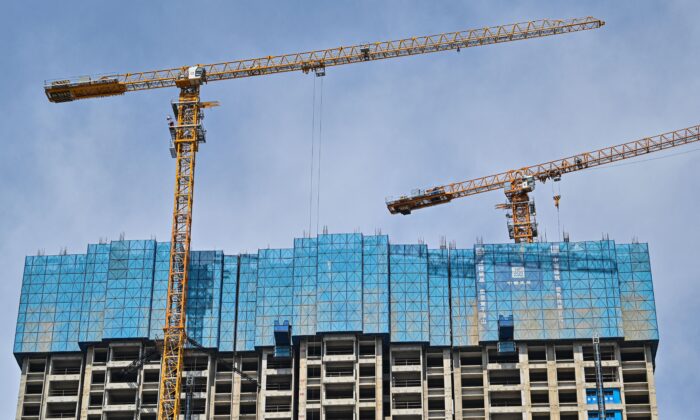Commentary
Amid China’s economic downturn, the Chinese Communist Party (CCP) has launched a significant initiative to buy back unsold homes from developers and repurpose them as affordable housing in an effort to stabilize housing prices and counteract the economic repercussions of declining real estate values. Funding for this buyback is expected to come from long-term or ultra-long-term government bonds.
However, there remain uncertainties about the effectiveness of this approach in revitalizing China’s economy and the potential impact of accruing long-term government debt on Chinese society.
A Hasty Action
During a recent episode of “Pinnacle View,” Independent TV producer Li Jun highlighted that the CCP hurriedly introduced the new policy due to poor property sales in the first four months of 2024.
He explained, “On May 17, Chinese Vice Premier He Lifeng announced at a national video conference that local governments in cities with high inventories of new homes can acquire unsold properties at reasonable prices to stabilize the housing market. These properties would then be transformed into affordable housing. The urgency of this announcement in May is likely a response to the significant decline in property sales, which fell by around 47 percent in the first four months of the year.”
Mr. Li also mentioned that affordable housing in China was initially introduced in 2007 but faced delays in implementation due to local governments heavily relying on revenue from land sales and real estate taxes. It wasn’t until 2017 when CCP leader Xi Jinping emphasized that “housing is for living, not for speculation,” that the affordable housing policy gained traction. By 2021, plans were established to construct hundreds of thousands of affordable housing units, yet this was still a small fraction compared to the 18 million units sold that year.
The new affordable housing policy primarily focuses on affordable rental housing, with a plan to build 8.7 million rental units nationwide from 2021 to 2025, accounting for 80 percent of the total. This aligns with Cao Jinbiao’s statement that new affordable rental housing should make up 30 percent of the total new housing supply during this period, with major cities like Shanghai and Guangzhou aiming for even higher proportions.
Mr. Li speculated, “In the future, the largest real estate company in China may be the local government. The landscape is changing, and while this move could alleviate real estate companies’ inventory in the short term, it might spell trouble for many companies in the long run. State-owned enterprises are expected to take on a more prominent role in building houses, with the government focusing on renting them out.”
Insufficient Government Funds
Guo Jun, president of The Epoch Times’ Hong Kong edition, discussed on “Pinnacle View” that China’s real estate crisis poses a significant challenge for the CCP and necessitates measures to prevent further deterioration of the property market.
She outlined the CCP’s strategies to address these challenges, including providing developers with capital through house purchases to alleviate financial strains, using purchased properties as collateral for loans to address banks’ lending issues, and stabilizing home prices to counteract asset value declines.
While these measures offer potential economic benefits, concerns linger regarding their efficacy and the availability of funds for large-scale buybacks. Ms. Guo emphasized the financial strain on local governments, noting that the central government’s initial 300 billion yuan commitment is inadequate given the immense scale of the buyback operation.
She calculated the substantial cost of buying back unsold homes in the market, estimating a requirement of 50 trillion yuan (approximately $6.9 trillion) to purchase 80 percent of the real estate backlog based on Q1 2024 prices.
The translation of the plan amounts to 10 trillion yuan ($1.3 trillion) annually over five years, according to Ms. Guo. She referenced China’s official financial data to support her argument, highlighting the central government’s deficit of 3.34 trillion yuan ($470 billion) in 2024, along with other figures such as local deficits, special national bonds, and government credit. The funds needed for the proposed buyback exceed the government’s annual deficit, raising concerns about the impact on the real estate market.
Ms. Guo warned that the CCP’s plan could lead to hyperinflation and economic regression, as the massive additional debt required for full implementation may result in excessive money printing and inflation. She emphasized the risks of disconnecting the currency from economic data and the potential consequences for asset values and the economy.
Former Shanghai entrepreneur Hu Liren suggested that China could revert to a system where all real estate is government-owned, turning homeowners into renters when their land use rights expire. He viewed this as a deliberate strategy by the CCP, signaling a return to a communist system where residents pay rent to the government.
The views expressed in the article are the author’s opinions and may not align with those of The Epoch Times.
Source link





